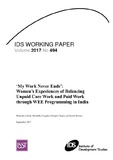‘My Work Never Ends’: Women’s Experiences of Balancing Unpaid Care Work and Paid Work through WEE Programming in India
| dc.contributor.author | Zaidi, M | |
| dc.contributor.author | Chigateri, S | |
| dc.contributor.author | Chopra, D | |
| dc.contributor.author | Roelen, K | |
| dc.coverage.spatial | India | en |
| dc.date.accessioned | 2017-09-12T14:41:52Z | |
| dc.date.available | 2017-09-12T14:41:52Z | |
| dc.date.issued | 2017-09 | |
| dc.identifier.citation | Zaidi, M.; Chigateri, S.; Chopra, D. and Roelen, K. (2017) ‘My Work Never Ends’: Women’s Experiences of Balancing Unpaid Care Work and Paid Work through WEE Programming in India, IDS Working Paper 494, Brighton: IDS | en |
| dc.identifier.isbn | 978-1-78118-387-8 | |
| dc.identifier.issn | 2040-0209 | |
| dc.identifier.uri | https://opendocs.ids.ac.uk/opendocs/handle/20.500.12413/13203 | |
| dc.description.abstract | This paper seeks to lay bare the contours and consequences of the relationship between paid work and unpaid care work for women in low-income households, in order to better understand the relationship between women’s participation in paid work and ‘economic empowerment’. It is also interested in analysing whether, and if so how, women (may) achieve a positive balance between their unpaid care work and paid work responsibilities such that their economic empowerment is optimised (women’s entry into paid work is enabled without deepening their time poverty or worrying about the quality of care received by their family), shared (across generations, so that other women/girls in the family are not left to bear the burden of care), and sustained (such that the quality of care provided to children improves as a result of their mother’s paid work). The paper seeks to do this by mapping the social organisation of care in low-income households across four sites in India, and assessing how women cope with their dual burdens. By focusing our analysis on two ‘women’s economic empowerment programmes’: the Mahatma Gandhi National Rural Employment Guarantee Act (MGNREGA) in Rajasthan and the Self Employed Women’s Association (SEWA) in Madhya Pradesh, we also seek to analyse how women’s economic empowerment policy and programming can generate a ‘double boon’: paid work that empowers women and provides more support for their unpaid care work responsibilities. | en |
| dc.description.sponsorship | International Development Research Centre (IDRC) | en |
| dc.description.sponsorship | UK Department for International Development | en |
| dc.description.sponsorship | Hewlett Foundation | en |
| dc.language.iso | en | en |
| dc.publisher | Institute of Development Studies | en |
| dc.relation.ispartofseries | IDS Working Paper;494 | |
| dc.rights | This is an Open Access paper distributed under the terms of the Creative Commons Attribution Non Commercial 4.0 International licence, which permits downloading and sharing provided the original authors and source are credited – but the work is not used for commercial purposes. http://creativecommons.org/licenses/by-nc/4.0/legalcode | en |
| dc.rights.uri | http://creativecommons.org/licenses/by-nc/4.0/ | en |
| dc.subject | Gender | en |
| dc.subject | Work and Labour | en |
| dc.title | ‘My Work Never Ends’: Women’s Experiences of Balancing Unpaid Care Work and Paid Work through WEE Programming in India | en |
| dc.type | IDS Working Paper | en |
| dc.rights.holder | Institute of Development Studies / The Institute of Social Studies Trust (ISST) | en |
| dc.identifier.team | Governance | en |
| rioxxterms.funder | Default funder | en |
| rioxxterms.identifier.project | Default project | en |
| rioxxterms.version | VoR | en |
| rioxxterms.funder.project | 9ce4e4dc-26e9-4d78-96e9-15e4dcac0642 | en |
Files in this item
This item appears in the following Collection(s)
-
Balancing unpaid work and paid work [20]
Explores the successes, challenges and lessons for Women’s Economic Empowerment programmes and policies -
IDS Research [1671]
Except where otherwise noted, this item's license is described as This is an Open Access paper distributed under the terms of the Creative Commons Attribution Non Commercial 4.0
International licence, which permits downloading and sharing provided the original authors and source are credited –
but the work is not used for commercial purposes. http://creativecommons.org/licenses/by-nc/4.0/legalcode


